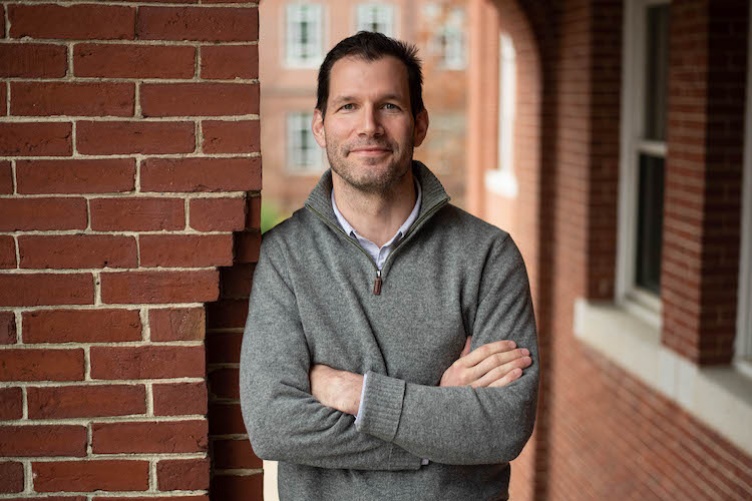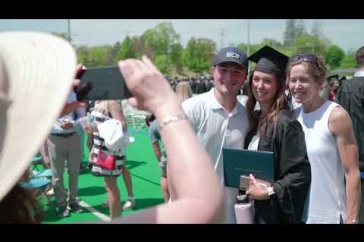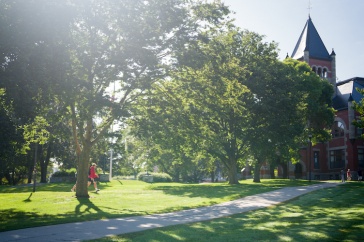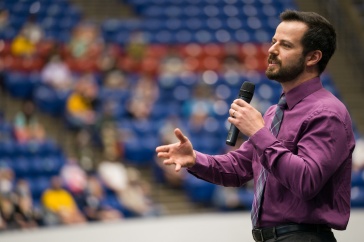
Editor's Note: This is the latest installment in a series featuring UNH faculty telling their stories in their own words.
Andrew Coppens, assistant professor of education in learning sciences
"I grew up in a town outside of Ann Arbor, Michigan, that was mostly white immigrants. My grandfather was from Belgium, my mother’s side of the family was Italian. Given how prominent conversations about immigration are now, I’m reminded of how important it is to know your own history. I grew up knowing both of my parents’ families were of European descent but not much about anyone’s actual way of life. That void is part of my story, as it is for many white people, but it’s not a part of the story that I consider very helpful.
My story is strongly connected to my twin brother. Our relationship has been critical to my identity and to how I see myself in the world. We look identical, sound identical — when we were young we even broke our noses in the same play in the same basketball game. Growing up we were compared all the time and assumed to be mostly similar. But we have some very different interests and styles; people often remind me how unalike we are. I’m not suggesting that gave rise to everything I’m interested in, but having to make sense of the expectation that we’re both similar and dissimilar prompted this central question: Why are we so different when we’re genetically identical?
That’s how I started getting interested in the various ways learning can be organized, asking more questions. Like, if we can manipulate situations of learning and development, can we get different outcomes? And how does cross-situational learning expand across cultures? A lot of people shy away from comparison because it makes them feel threatened or just in general is pretty sticky to do. Over time I became less concerned with the potential downsides of making comparisons and became interested in how to do them well.
I attended UNH as an undergraduate and majored in outdoor education. After graduation I worked a couple of experiential education-type jobs, and then I went into the Peace Corps and taught elementary school in Nicaragua. I saw the same kids running to the dairy farm to work and then in my classroom later the same day — to see them in both situations was one of the most illuminating experiences I’ve had as a teacher and now researcher. It was the first instance of this veil being lifted, being able to see students in other roles than student. I wondered: Can I make these students look as good in the classroom as this dairy farm makes them look?
After Nicaragua, I went to the University of California at Santa Cruz to get a Ph.D. in developmental psychology with specialization in cultural inquiry. My mother didn’t go to college. My father worked in finance. I’m the first person in my family to get a Ph.D. I didn’t really have an idea of the academy as a career track. I went into academia because I wanted to continue to ask questions. If I had ended up asking questions outside of academia, that would have been fine, too. My career choice was not as much about identifying as a professor as it was a way to ask questions I thought were important and pursue their answers.
As an undergraduate I had a professor who, before he became one, owned a business framing houses. He told me that he loved working for himself, but it was a lot of pressure to make payroll – academia, for him, retained the autonomy of owning a business. It was the first time I had ever heard any reason why a person would want to be a professor. The story wasn’t that those with blinding intellect just somehow ended up being professors. To me, that was a better view of how and why professors became professors. It also left room for the possibility that someone with blinding intellect could build houses.
A friend of mine sent me the job posting for UNH; I wasn't actively trying to come back to the New England, but it turned out to be a unique and interesting position. I started here in 2015."
Coppens teaches courses on culture and human development. His research, in part, focuses on how children’s learning and development is rooted in the activities of everyday life.
-
Written By:
Jody Record ’95 | Communications and Public Affairs | jody.record@unh.edu



















































